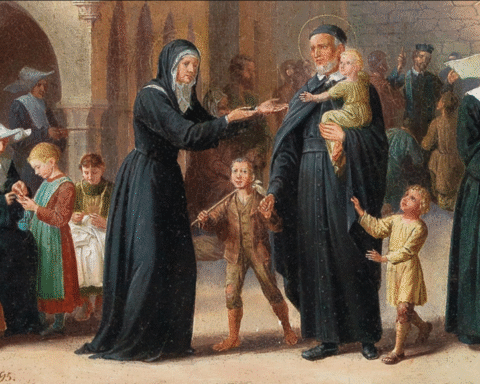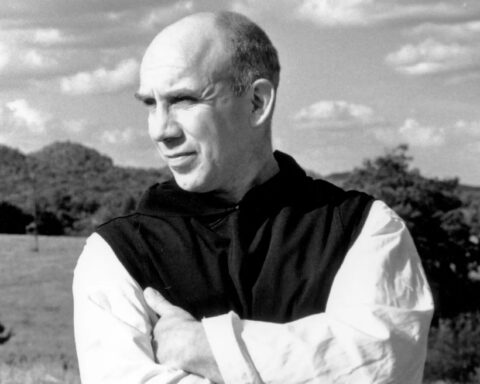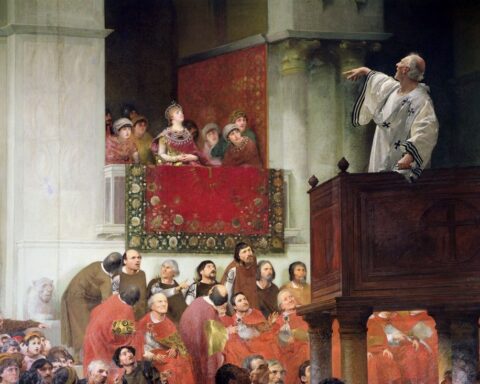July 11 is the Feast of Saint Benedict of Nursia, the father of Western monasticism. He wrote his rulebook for monastic life around 530, and it emerged as a model for religious communities throughout the Middle Ages. It has come to be known as the Rule of St. Benedict and remains an essential guide for the structure of Catholics living in community to this day.
“Ora et labora,” or “pray and work,” is the axiom at the heart of Benedict’s rule. It points to the necessity we all have to commune with God and live productive lives. But arriving at this starting point was far from simple in Benedict’s time.
Born into a noble family in Nursia, Italy, Benedict was sent to Rome as a young man to finish his education, but was disappointed to find a preoccupation among his educators with the cultivation of rhetorical skills devoid of any focus on God. So, he left Rome to pursue a life of holiness and was drawn to live in solitude for a time under the direction of a hermit named Romanus. Other monks eventually sought out Benedict’s leadership, and though he faced early conflicts in his attempts to build religious communities, he succeeded at Monte Cassino, where he founded the monastery that would form the roots of the Church’s monastic tradition.
Click here to subscribe to our weekly newsletter.
Though Benedict shunned the trend toward vanity in Roman education of the time, he never lost sight of the importance of cultivating personal talents. He merely sought to direct those talents towards God. In the counsel he gave to his community, he said, “Let us consider our place in sight of God and of His angels. Let us rise in chanting that our hearts and voices harmonize.”
Though Benedict’s rules are known for being strict, they are intended for those who freely choose the challenging path he lays out and are aimed at cultivating a loving environment where all members of the community can thrive and grow in their devotion to God. In Chapter IV of his rule, Benedict provides instruction on personal discipline but also on love of neighbor, extolling his community “to relieve the poor; to clothe the naked; to visit the sick; to bury the dead; to help in tribulation; to console the sorrowing.” He ends this section by instructing, “And never to despair of the mercy of God.”
During a time when the Roman empire was crumbling and lawlessness threatened towns and cities across Europe, Benedict’s rule became a guide for those determined to live in love and harmony with one another. The monasteries of the Middle Ages, inspired by his rule, are now credited with preserving knowledge that would have otherwise been lost—and with cultivating a way of life that became a seed for Christianity to flourish.
In 1964, then-Pope, now-Saint, Paul VI declared St. Benedict Patron of Europe, calling him, “Messenger of peace, molder of union, magister of civilization, and above all herald of the religion of Christ and founder of monastic life in the West.” And regarding the enduring importance of Benedict’s rule in cultivating a civil society, Pope Benedict XVI said, “In seeking true progress, let us also listen to the Rule of St. Benedict as a guiding light on our journey.” So let us pray that St. Benedict of Nursia intercedes for our religious communities around the world to be the seed once again for a revival of culture, love of neighbor, and faith in Christ.
For free copies of the Christopher News Note RESPECT THOSE WHO LABOR AMONG YOU, write: The Christophers, 264 West 40th Street, Room 603, New York, NY 10018; or e-mail: mail@christophers.org







